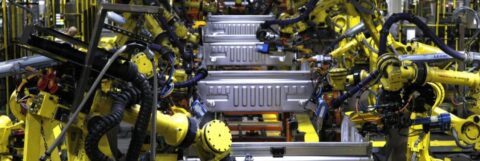Michigan Advance
Aug, 6, 2023
Rick Haglund
Michigan is striving to become the nation’s leader in the development and manufacturing of electric and self-driving vehicles, maintaining the state’s long-held distinction of being one of the world’s premier auto capitals.
But there’s a problem, and it’s a big one: Many of the state’s future workers don’t want to be a part of it.
A new survey by MICHauto, an industry promotional association, found that more than half of Michigan residents aged 17 to 24 don’t view the auto industry as an attractive career choice or one that is culturally diverse, an important consideration for many young workers. And only about 25% of young adults living outside of Michigan would consider moving here to work in the auto industry.
What’s more, the percentage of young Michigan residents who see the auto industry as a compelling career choice hasn’t budged from a similar MICHauto survey six years ago. That’s an ominous sign for a state with a stagnant population that’s competing against many other states for talent to grow its economy.
“The reality is we have work to do,” said Glenn Stevens Jr., MICHauto’s executive director. “The problem is we know we’re not losing as many graduates as we think we are, but we’re not attracting enough high-tech talent from other places.”
A recent study by urbanist Richard Florida found that Michigan, contrary to conventional wisdom, does a good job of retaining college graduates. It ranks seventh for the percentage of college and university graduates who stay in the state. But “Michigan lags badly in attracting young, college-educated tech talent from elsewhere,” Florida said.
Florida’s study was done for the Detroit Regional Chamber, of which MICHauto is a part. The MICHauto report was conducted by Lambert, a Grand Rapids-based public relations firm. It surveyed 635 young Michigan residents and 225 outside the state. It asked them for their perceptions of the auto industry, ranging from the factory floor to its technology centers and other salaried areas.
Among the key findings:
- The auto industry is seen as offering high wages, but a poor work-life balance, which is increasingly important to young workers. Seventy-one percent of young people said the industry’s work-life balance was “OK, very poor or terrible.”
- Young people view California as the leader in developing electric vehicles.
- Many young people say factory jobs are physically demanding, dirty, dangerous and prone to frequent layoffs.
- Women and minorities are especially concerned about safety and equity in the industry.
Lambert also surveyed 526 older adult “influencers” — parents, teachers, school counselors, college professors and leaders of youth organizations. It found influencers have a more positive view of the auto industry. But in many cases, young people aren’t buying what they’re selling.
Stevens said part of the problem is the lack of school counselors who can advise students on the various careers available in the industry. Michigan had just one counselor for 615 students in the 2021-22 school year, ranking the state 48th in the country.
“A lot of youth believes you do not need much education beyond high school to work in the auto industry,” he said. “We’re not doing a very good job with developing career pathways.”
While the nature of auto factory jobs hasn’t changed a lot in the past several decades, the technology tools used to perform them has, requiring more technical skills by workers. At the same time, many see little value in obtaining education beyond high school.
A statewide poll in March by the Glengariff Group for the Detroit Regional Chamber found just 27% of voters believe “a college education is very important for a successful job.” And half of Michigan voters said they were opposed to the auto industry transitioning from gas-powered to electric vehicles.
“Is it any wonder we have a disconnect between jobs that are available and educational requirements for obtaining them?” Stevens said.
Florida’s study found that Michigan struggles to attract tech talent in part because of relatively low wages for knowledge jobs. For example, the state ranks 19th in average wages for computer programmers.
And although Michigan is still the U.S. leader in vehicle development and production, “Michigan’s capabilities are skewed toward technologies and skills of the past,” his study said. Automakers must speed “toward the new digital, connected, electric vehicle technologies of the future.”
Changing the perception, and the reality, of the auto industry to being a technology industry could be key to luring more young talent to the business. Many young people want to live in desirable areas and work for innovative companies striving to solve “global issues,” Stevens said.
Industry leaders and state officials have been trying to do that by recasting the auto sector as the “mobility industry.” Michigan even has an Office of Future Mobility and Electrification in state government.
But the MICHauto survey found that “mobility” is a term “fraught with confusion,” particularly among adult influencers. Many associate it with cell phones, remote work, disability services and moving one’s place of residence.
“Auto is perceived as a bit of an old term and mobility is nebulous,” Stevens said.
Even MICHauto, which often uses “mobility” in its work, is in the early stages of rebranding the organization.
It’s also soon launching a “social media influencer strategy” that will feature young people in the auto industry talking about their jobs and the communities where they live.
Attracting more talent to (don’t call it) the auto industry, particularly in its knowledge sector, is crucial to Michigan’s future prosperity.

